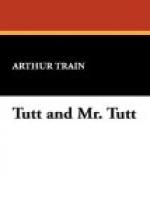“What did they do with the three little pigs?” inquired Tutt with some interest.
“They were pardoned on account of their extreme youth,” said Mr. Tutt, “and turned loose again—with a warning.”
“I’m glad of that!” sighed Tutt. “Is that a real case?”
“Absolutely,” replied his partner. “I’ve read it in the Sauvigny records.”
“I’ll be hanged!” exclaimed Tutt. “I never knew that animals were ever held personally responsible.”
“Why, of course they were!” said Mr. Tutt. “Why shouldn’t they be? If animals have souls why shouldn’t they be responsible for their acts?”
“But they haven’t any souls!” protested Tutt.
“Haven’t they now?” remarked the elder lawyer. “I’ve seen many an old horse that had a great deal more conscience than his master. And on general principles wouldn’t it be far more just and humane to have the law deal with a vicious animal that had injured somebody than to leave its punishment to an irresponsible and arbitrary owner who might be guilty of extreme brutality?”
“If the punishment would do any good—yes!” agreed Tutt.
“Well, who knows?” meditated Mr. Tutt. “I wonder if it ever does any good? But anybody would have to agree that responsibility for one’s acts should depend upon the degree of one’s intelligence—and from that point of view many of our friends are really much less responsible than sheep.”
“Which, as you so sagely point out, would, however be a poor reason for letting their families punish them in case they did wrong. Just think how such a privilege might be abused! If Uncle John didn’t behave himself as his nephews thought proper they could simply set upon him and briskly beat him up.”
“Yes, of course, the law even to-day recognizes the right to exercise physical discipline within the family. Even homicide is excusable, under Section 1054 of our code, when committed in lawfully correcting a child or servant.”
“That’s a fine relic of barbarism!” remarked Tutt. “But the child soon passes through that dangerous zone and becomes entitled to be tried for his offenses by a jury of his peers; the animal never does.”
“Well, an animal couldn’t be tried by a jury of his peers, anyhow,” said Mr. Tutt.
“I’ve seen juries that were more like nanny goats than men!” commentated Tutt. “I’d like to see some of our clients tried by juries of geese or woodchucks.”
“The field of criminal responsibility is the No Man’s Land of the law,” mused Mr. Tutt. “Roughly, mental capacity to understand the nature of one’s acts is the test, but it is applied arbitrarily in the case of human beings and a mere point of time is taken beyond which, irrespective of his actual intelligence, a man is held accountable for whatever he does. Of course that is theoretically unsound. The more intelligent a person is the more responsible he should be held to be and the higher




